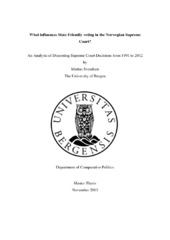What influences State Friendly voting in the Norwegian Supreme Court?. An Analysis of dissenting Supreme Court Decisions from 1991 to 2012
Master thesis
Permanent lenke
https://hdl.handle.net/1956/7678Utgivelsesdato
2013-11-19Metadata
Vis full innførselSamlinger
Sammendrag
The aim of this thesis is investigate if the Norwegian Supreme Court exhibits a state friendly nature when they vote in dissenting civilian cases where one of the litigants is the state in the time period 1991-2012. The state friendly hypothesis holds that the state tends to win more cases than private litigants, and that this tendency can't be explained by only the legal aspects of a case. Therefore this thesis will explore the non-legal factors that are apt to influence how a justice votes. Some of these factors are the ideology of the justice, measured by appointing government, the personal traits of the justice, factors connected to the case and the influence of the collegial nature of the court. This can be summed up in the research question: What factors influences the Supreme Court Justices in dissenting cases where the state is one of the litigants. There are several theoretical models for analysing the voting behaviour of the Supreme Court. The most central of these models in this thesis is the Attitudinal Model. The thesis features an in-depth discussion on why the Attitudinal Model is applicable for research on the Norwegian Supreme Court To test the hypothesis, the thesis utilises a logistical regression model consisting of 509 justice-observations. The optimal model for analysing hierarchical data, a multilevel model could not be used in this analysis because this model is not applicable when only analysing dissenting cases. The lack of multilevel analysis made panel effects mostly impossible to determine. The results of the analysis show that justices appointed by social-democratic governments are statistically more likely to vote in favour of the state than justices appointed by non-social democratic governments. The results also showed that former occupation in the Legislation Department was had an especially strong positive effect for voting for the state, while being a former law professor had a negative effect. In addition the results showed that the degree of state friendliness varied between different areas of the law.
